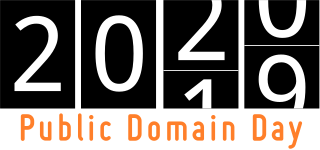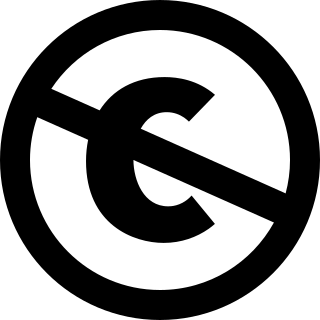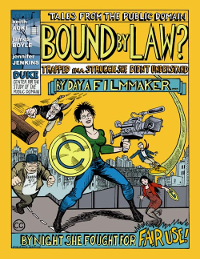Copyright is the exclusive right given to the creator of a creative work to reproduce the work, usually for a limited time. The creative work may be in a literary, artistic, educational, or musical form. Copyright is intended to protect the original expression of an idea in the form of a creative work, but not the idea itself. A copyright is subject to limitations based on public interest considerations, such as the fair use doctrine in the United States. Some jurisdictions require "fixing" copyrighted works in a tangible form. It is often shared among multiple authors, each of whom holds a set of rights to use or license the work, and who are commonly referred to as rights holders. These rights frequently include reproduction, control over derivative works, distribution, public performance, and moral rights such as attribution.

The Statute of Anne, also known as the Copyright Act 1710, is an act of the Parliament of Great Britain passed in 1710, which was the first statute to provide for copyright regulated by the government and courts, rather than by private parties.
Eldred v. Ashcroft, 537 U.S. 186 (2003), was a decision by the Supreme Court of the United States upholding the constitutionality of the 1998 Sonny Bono Copyright Term Extension Act (CTEA). The practical result of this was to prevent a number of works from entering the public domain in 1998 and following years, as would have occurred under the Copyright Act of 1976. Materials which the plaintiffs had worked with and were ready to republish were now unavailable due to copyright restrictions.

Estate of Martin Luther King, Jr., Inc. v. CBS, Inc. is a United States court case that involved a longstanding dispute about the public domain copyright status of the text of Martin Luther King, Jr.'s famous speech, known by the key phrase "I Have a Dream", originally delivered on the steps at the Lincoln Memorial in Washington, D.C. on August 28, 1963. The court ruled that King's delivery of the speech was a "performance", rather than a "general publication", of its text, and therefore overruled a lower court judgment granting summary judgment in CBS's favor. The two sides ultimately settled the matter out of court instead of appealing to a higher court.
A work of the United States government, as defined by the United States copyright law, is "a work prepared by an officer or employee" of the federal government "as part of that person's official duties." In general, under section 105 of the Copyright Act, such works are not entitled to domestic copyright protection under U.S. law and are therefore in the public domain.

James Boyle is a Scottish intellectual property scholar. He is the William Neal Reynolds Professor of Law and co-founder of the Center for the Study of the Public Domain at Duke University School of Law in Durham, North Carolina. He is most prominently known for his advocating for loosening copyright policies in the United States and worldwide.

Public Domain Day is an observance of when copyrights expire and works enter into the public domain. This legal transition of copyright works into the public domain usually happens every year on 1 January based on the individual copyright laws of each country.

Public-domain software is software that has been placed in the public domain: in other words, there is absolutely no ownership such as copyright, trademark, or patent. Software in the public domain can be modified, distributed, or sold even without any attribution by anyone; this is unlike the common case of software under exclusive copyright, where software licenses grant limited usage rights.

Free content, libre content, or free information, is any kind of functional work, work of art, or other creative content that meets the definition of a free cultural work.

The Copyright Term Extension Act (CTEA) of 1998 extended copyright terms in the United States. It is one of several acts extending the terms of copyrights.
Japanese copyright laws consist of two parts: "Author's Rights" and "Neighbouring Rights". As such, "copyright" is a convenient collective term rather than a single concept in Japan. Japan was a party to the original Berne convention in 1899, so its copyright law is in sync with most international regulations. The convention protected copyrighted works for 50 years after the author's death. However, in 2004 Japan extended the copyright term to 70 years for cinematographic works. At the end of 2018, as a result of the Trans-Pacific Partnership negotiations, the 70 year term was applied to all works. This new term is not applied retroactively; works that had entered the public domain between 1999 and 2018 by expiration would remain in the public domain.
The public domain consists of all the creative work to which no exclusive intellectual property rights apply. Those rights may have expired, been forfeited, expressly waived, or may be inapplicable.

The Copyright Act of 1976 is a United States copyright law and remains the primary basis of copyright law in the United States, as amended by several later enacted copyright provisions. The Act spells out the basic rights of copyright holders, codified the doctrine of "fair use," and for most new copyrights adopted a unitary term based on the date of the author's death rather than the prior scheme of fixed initial and renewal terms. It became Public Law number 94-553 on October 19, 1976 and went into effect on January 1, 1978.
The copyright law of the United States is intended to encourage the creation of art and culture by rewarding authors and artists with a set of exclusive rights. Copyright law grants authors and artists the exclusive right to make and sell copies of their works, the right to create derivative works, and the right to perform or display their works publicly. These exclusive rights are subject to a time limit, and generally expire 70 years after the author's death. In the United States, any music composed before January 1, 1924, is generally considered public domain.

Copyright infringement is the use of works protected by copyright law without permission for a usage where such permission is required, thereby infringing certain exclusive rights granted to the copyright holder, such as the right to reproduce, distribute, display or perform the protected work, or to make derivative works. The copyright holder is typically the work's creator, or a publisher or other business to whom copyright has been assigned. Copyright holders routinely invoke legal and technological measures to prevent and penalize copyright infringement.
Works are in the public domain if they are not covered by intellectual property rights, such as copyright, at all, or if the intellectual property rights to the works has expired.
When a work's copyright expires, it enters the public domain. The following is a list of works that enter the public domain in 2012. Since laws vary globally, the copyright status of some works are not uniform. Not all works in the public domain have been expired, some works are deliberately donated into the collection for the public good or have been abandoned by their owners.

Bound by Law?: Tales from the Public Domain is a comic book about intellectual property law and the public domain published in 2008 by Duke University Press. Written by Keith Aoki, James Boyle and Jennifer Jenkins and supported by the Center for the Study of the Public Domain at the Duke Law School, the book was first released in a free digital edition under a Creative Commons license in 2006. The 2008 edition has an introduction by Cory Doctorow and a foreword by Davis Guggenheim.
When a work's copyright expires, it enters the public domain. The following is a list of works that entered the public domain in 2019. Since laws vary globally, the copyright status of some works are not uniform.
When a work's copyright expires, it enters the public domain. The following is a list of works that enter the public domain in 2020. Since laws vary globally, the copyright status of some works is not uniform.








